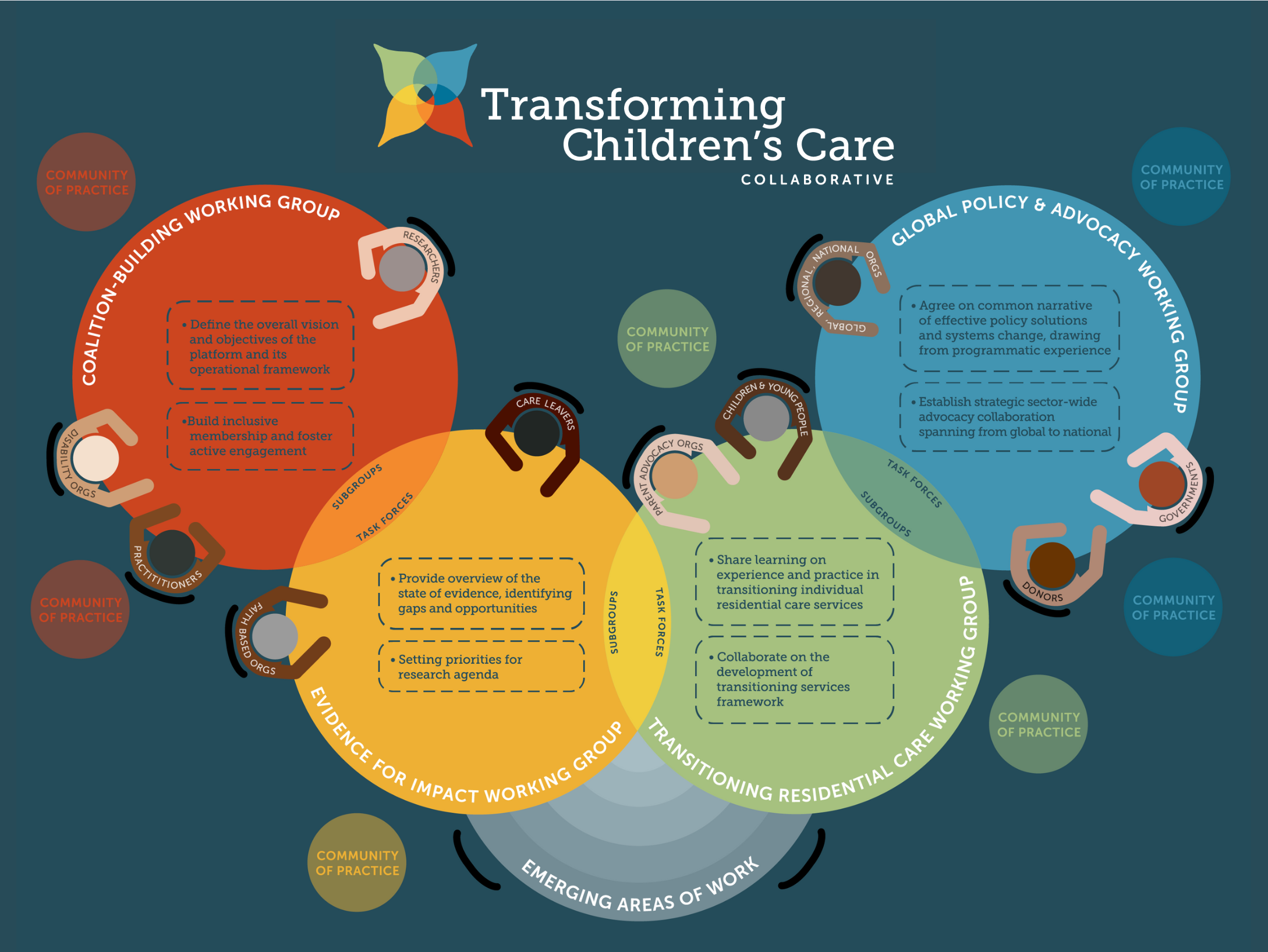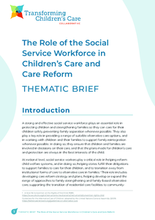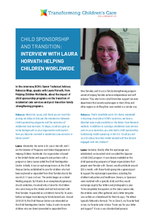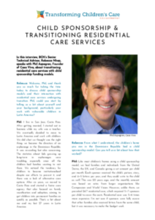
Building on joint efforts advocating for the 2019 UNGA Resolution and the Key Recommendations, and clear interest expressed by a broad group of actors to strengthen sectoral cooperation and collaboration, Better Care Network together with partners established the Transforming Children’s Care Collaborative. The Collaborative aims to establish more strategic sector-wide collaboration spanning the global to the local level and inclusive of a wider range of stakeholders. It aims to enable organisations engaged in child protection and care reform to agree on common principles and approaches, leverage and build on one another’s work, secure greater and more sustainable impact, contribute to a shared learning agenda and undertake joint advocacy.
The Collaborative is open to all actors involved in children’s care, with active participation of self advocates (care leavers; parent advocates); disability organizations; faith-based organizations; local organizations/CBOs and other relevant communities and sectors.
There are a number of exciting opportunities for you to immediately get involved in shaping the Collaborative.
Thus far, a number of Working Groups have been created, including:
- Coalition-Building Working Group: This broad and inclusive working group has been established for the interim development phase of the platform. The group will be responsible for: defining the vision and objective for the platform; establishing guidelines for inclusive membership; setting up ways of working and procedures; developing a transitional governance structure and expanding the platform’s membership through outreach into different segments of the care sector.
-
Evidence for Impact Working Group: This group aims to bring together researchers, measurement experts and practitioners working on establishing data systems on children’s care to foster a strategic and well-coordinated approach to research and data in the sector, with a focus on generating and applying ‘evidence for impact’ on policy, systems and practice globally.
-
Transitioning Residential Care Working Group: This group brings together existing initiatives and discussions around different aspects of transitioning residential care services. The working group is currently collaborating on the development of an open source transitioning services framework to guide future collaboration and is open to organisations and practitioners with direct experience and involvement in transitioning individual residential care services.
-
Global Policy and Advocacy Working Group: This working group aims to bring together a range of advocacy initiatives to support the implementation of global commitments towards children’s care and child protection and care systems reform. It builds on advocacy efforts behind the 2019 UNGA Rights of the Child resolution, and on the Key Recommendations to strengthen consensus and address key areas of policy disagreement to enable more effective advocacy at global, regional, and national levels, with concrete examples and evidence from diverse settings.
-
Other Working Groups: Members of the Collaborative are invited to suggest a topic for a future working group or subgroup and/or identify an issue or gap that needs to be addressed through the collaborative platform. New working groups and subgroups will be established as need and interest are identified by members and information shared with the wider group via email.
Displaying 1 - 10 of 46
On November 13, 2025, the Transforming Children's Care Collaborative hosted a webinar to explore insights from two Australian initi
On October 23, 2025, the Transforming Children’s Care Collaborative hosted a webinar exploring Kafaalah—a long-standing childcare practice in Muslim communities that has been observed for more than 1,400 years.
Changing the Way We Care (CTWWC) is a global initiative which promotes safe, nurturing family care for children.
On November 20, 2024, the Evidence for Impact Working Group as part of the Transforming Children’s Care Collaborative hosted the "Building Evidence to Impact Care Re
On November 20, 2024, the Evidence for Impact Working Group as part of the Transforming Children’s Care Collaborative hosted the "Building Evidence to Impact Care Reform - Challenges and Le
This thematic brief helps government policy and decision-makers understand the essential role of the social service workforce and how to strengthen that workforce in line with their national commitments to care reform and regional and global conventions. It includes high level guidance, recommendations and practical examples from diverse contexts for consideration when developing, supporting and strengthening the social service workforce.
The Transitioning Residential Care Working Group, part of the Transforming Children’s Care Collaborative, launched the Divesting of Residential Care Guidelines and the Transition Monitoring Tool for practitioners, advocates, organization
In this interview, BCN’s Senior Technical Advisor, Rebecca Nhep, speaks with Laura Horvath, from Helping Children Worldwide, about the impact of child sponsorship programs on the transition of residential care services and post transition family strengthening programs.
In this interview, BCN’s Senior Technical Advisor, Rebecca Nhep, speaks with Phil Aspegren, Founder of Casa Viva, about transitioning residential care services with child sponsorship funding models.
Resistance from donors is a common barrier for organizations transitioning from residential care to family-based care. What works to sustain and even increase funding for organizations in transition?



